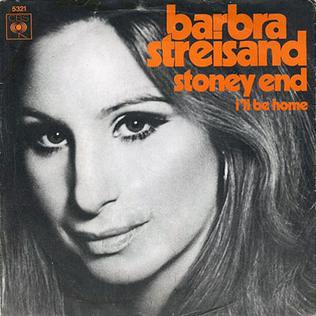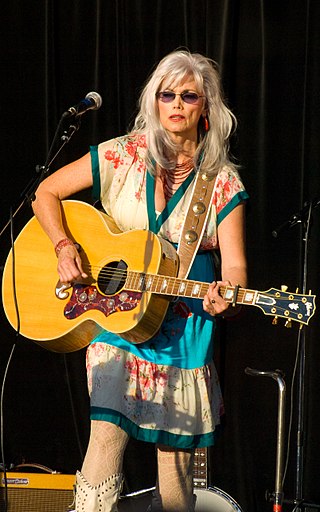
"That'll Be the Day" is a song written by Buddy Holly and Jerry Allison. It was first recorded by Buddy Holly and the Three Tunes in 1956 and was re-recorded in 1957 by Holly and his new band, the Crickets. The 1957 recording achieved widespread success. Holly's producer, Norman Petty, was credited as a co-writer, although he did not contribute to the composition.
"Poor Poor Pitiful Me" is a rock song written and first recorded by American musician Warren Zevon in 1976.

Karla Bonoff is an American singer-songwriter. While Bonoff has released a number of albums, she is primarily known for her songwriting. Bonoff's songs include "Home," covered by Bonnie Raitt, "Tell Me Why" by Wynonna Judd, and "Isn't It Always Love" by Lynn Anderson.

Trio is a collaborative album by American singers Dolly Parton, Linda Ronstadt, and Emmylou Harris. It was released on March 2, 1987, by Warner Bros. Records. The album has platinum certification in the U.S. for sales of one million copies, and has total worldwide sales of approximately four million. A second collaborative album, Trio II, was released in 1999.

"Ooo Baby Baby" is a song written by Smokey Robinson and Pete Moore. It is a classic 1965 hit single by The Miracles for the Tamla (Motown) label. The song has inspired numerous other cover versions by other artists over the years, including covers by Ella Fitzgerald, Todd Rundgren, The Escorts, The Five Stairsteps, Linda Ronstadt, and many others. The Miracles' original version of "Ooo Baby Baby" is listed as number 266 on Rolling Stone Magazine's list of "The 500 Greatest Songs of All Time".
"Don't Know Much" is a song written by Barry Mann, Cynthia Weil and Tom Snow. Mann was the first to record the song in 1980, gaining a minor chart hit in the US. The song was made famous when it was covered as a duet by Linda Ronstadt and Aaron Neville in 1989. Their version was a worldwide success, topping the Irish Singles Chart and reaching the top 10 in several territories.
"All My Life" is a hit song written by Karla Bonoff and originally performed by Bonoff on her album New World (1988).

"Lonely Boy" is an international hit song from 1977, written and recorded by Andrew Gold in 1976 for his album What's Wrong with This Picture? It spent five months on the American charts, peaking at number seven in both Canada and the United States, the latter for three consecutive weeks on June 11, 18 and 25, 1977, and number 11 in the United Kingdom. While "Lonely Boy" would be Gold's biggest U.S. hit, his track "Never Let Her Slip Away" achieved greater success in the U.K.

"You're No Good" is a song written by Clint Ballard Jr., first performed by Dee Dee Warwick for Jubilee Records in 1963 with production by Jerry Leiber and Mike Stoller. It has since been covered by many artists, including charting versions by Betty Everett in 1963, The Swinging Blue Jeans in 1964, and Linda Ronstadt in 1974, whose version was a number 1 hit in the United States.

Don't Cry Now is a studio album by American singer Linda Ronstadt. It was released by Asylum Records on October 1, 1973 and contained ten tracks. While some tracks were new material, many of the songs were cover tunes. The album explored the genres of Country folk, country rock and pop rock. It was Ronstadt's first album recorded on the Asylum label and first to feature producer Peter Asher. Don't Cry Now was given favorable reviews from several music publications and was a commercial success. Along with reaching chart positions in multiple countries, it also certified gold in the United States for selling over 500,000 copies.

Hasten Down the Wind is the seventh studio album by singer-songwriter Linda Ronstadt. Released in 1976, it became her third straight million-selling album. Ronstadt was the first female artist to accomplish this feat. The album earned her a Grammy Award for Best Pop Vocal Performance, Female in 1977, her second of 13 Grammys. It represented a slight departure from 1974's Heart Like a Wheel and 1975's Prisoner in Disguise in that she chose to showcase new songwriters over the traditional country rock sound she had been producing up to that point. A more serious and poignant album than its predecessors, it won critical acclaim.

The singles discography of American singer Linda Ronstadt contains 80 lead and collaborative singles, four as a featured artist, eight promotional singles and seven other charted songs. Her first credited release was 1967's "Different Drum", which also included the Stone Poneys along with Ronstadt as a featured artist. Ronstadt's first pair of solo singles were released by Capitol Records in 1969. The 1970 release "Long, Long Time" was her first solo charting single. Her 1974 single "You're No Good" topped the US Hot 100, reached number seven in Canada and number 15 in Australia. Its B-side song "I Can't Help It " reached number two on the US Hot Country Songs list. It was followed by 1975's "When Will I Be Loved", which made the top ten on multiple charts in the United States and Canada, including topping their country surveys. It was followed by the US top five song "Heat Wave" and the US country top five song "Love Is a Rose".

"Everybody Plays the Fool" is a 1972 song first recorded by American R&B group The Main Ingredient, and written by J. R. Bailey, Rudy Clark and Ken Williams. It was the first single released from the group's album Bitter Sweet, released with the B-side "Who Can I Turn To ". "Everybody Plays the Fool" was the group's highest charting hit single, reaching No. 3 on the Billboard Hot 100 chart in the fall of 1972. It also peaked at No. 2 on the Billboard R&B chart and at No. 25 on the Billboard adult contemporary chart. It was certified gold by the RIAA.

"If You Love Me (Let Me Know)" is a song written by John Rostill that was a 1974 hit single for Olivia Newton-John. It was her second release to hit the top 10 in the United States, reaching number 5 on the pop chart and number 2 on the Easy Listening chart. It also reached number 2 on the Billboard country chart. As with her single "Let Me Be There", Mike Sammes sings a bass harmony. It was nominated for the 1974 Country Music Association Award for Single of the Year.

"Tell Me Why" is a song written and recorded by Karla Bonoff for her 1988 studio album New World. In 1993, the song was covered by American country music artist Wynonna and released in April 1993 as the first single and title track from her album Tell Me Why. The song reached number 3 on the Billboard Hot Country Singles & Tracks chart in May 1993 and number 1 on the RPM Country Tracks chart in Canada the following month.

"An American Dream" is a song written by Rodney Crowell. He recorded it under the title "Voilá, An American Dream" on his 1978 album Ain't Living Long Like This, and released it as the B-side to that album's single "(Now and Then There's) A Fool Such as I".

"Stoney End" is a song written by Laura Nyro and released in February 1967 on her debut album More Than a New Discovery. According to childhood friend Alan Merrill, Nyro originally intended the song, a gospel-inflected uptempo piece, to be performed at a slower pace. The best known recording of Nyro's album version of the song was a hit for Barbra Streisand in 1970.

"Long, Long Time" is a song written by Gary White which became a hit for Linda Ronstadt in 1970. Ronstadt included the song on her album Silk Purse. "Long, Long Time" is about a lasting love for someone who never became a lover.

The singles discography of American singer–songwriter Emmylou Harris contains 58 singles issued as a solo artist, 11 issued in collaboration with other artists, 13 issued as a featured artist and six promotional singles. Her singles discography also contains two other charted songs and 14 music videos that were released in conjunction with singles and songs.

"Someone to Lay Down Beside Me" is a song written by Karla Bonoff that was originally recorded by American singer Linda Ronstadt. First released on her album Hasten Down the Wind, "Lose Again" was then spawned as the third single from the disc in May 1977. The song was among Ronstadt's lowest-charting singles in the US and Canada, but received critical acclaim from Cashbox following its release.

















